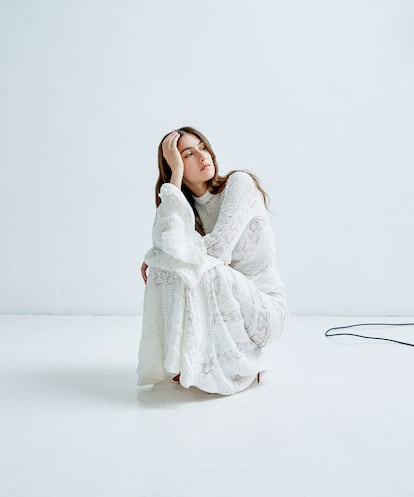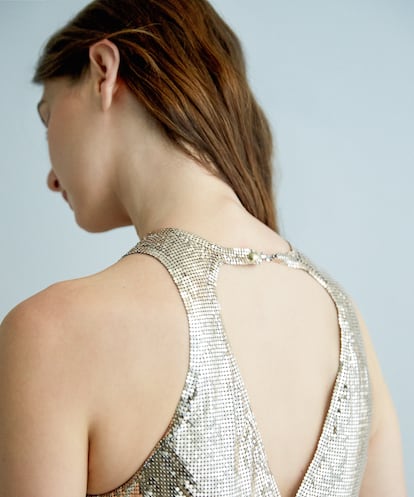Weyes Blood, singer: ‘What is strange to me is how Gen Z has no interest in sex’
Blending touches of Joni Mitchell, Lana del Rey and Pre-Raphaelite gentlewoman, Weyes Blood’s artistic personality seems supremely witchy. We speak with the Californian singer-songwriter, whose charisma permeates her every move

The music of Weyes Blood (Santa Mónica, 35 years old) could be classified as romantic, because without a doubt its feature sounds evoke the word in its most philosophical and transcendental sense. That becomes apparent as soon as a mysterious Parnassian lute collides with a synthesizer, as the howl of an electric guitar mixes with a decadent and plaintive organ. And yet, the Californian Natalie Mering (her stage name is a homage to a Flannery O’Connor novel, Wise Blood) is not a romantic in the conventional sense. “Of course, I suffer for love, and it’s a subject I care about. But I’m not a modern writer who will literally say, ‘Hey, you didn’t answer me on WhatsApp.’ And at the same time, my last song, with much more abstract concepts, is actually talking about when they leave you on read,” explains the singer with the same meaningful, mysterious, and incredibly beautiful grace that forms part of her personal identity.

In the Tetuán studio where her photoshoot is taking place, striking a psychedelic priestess pose, she seems capable of even controlling how the light falls on the folds of the dresses that she herself picked out. Later that evening, at the concert she will give in a well-known Madrid venue to present her fifth album, And in the Darkness, Hearts Aglow (2022), her control of the audience’s mood will be equally impressive.
Mering is one of those singer-songwriters who enjoys being in the studio, experimenting with sound (her musical preferences are shockingly eclectic: she loves medieval music, classical Renaissance, Demis Roussos, Aphrodite’s Child, Joni Mitchell, Neil Young and Enya), but at the same time, she is a creature of the live and direct. She is especially happy in Europe, where her old soul (as she calls it) comes into contact with legacies from a remote past. “For example, I’ve been happy in Portugal, OK, maybe the trains have brutal delays and the bureaucracy is crazy, but people eat such high-quality food and they approach everything with a different philosophy. I love going places where great empires have fallen, because I think that the American empire is in the same state of decay right now, so being in places like Greece, Italy and Spain, which were undefeatable hundreds of years ago and continue to exist, is kind of a relief,” she says, employing a somewhat grim sense of humor that also surfaces when she explains why a millennial like herself has never felt part of her generation, but rather several others at the same time. “There are ways in which I feel close to the boomers. My parents were musicians and my mother was the typical girl from Laurel Canyon, but at the same time they are very Christian and they had us growing up watching The Wizard of Oz. Then my brother was standard Gen X, which was incredibly formative for me, because I’m capable of listening to Nirvana and finding refuge in that sound. I love noise. At the same time, there was this kind of nostalgia for pop and its pastiches born out of millennial culture that I can recognize myself in. Finally, there are the Z’s, who are totally let down by a world that offers them no future, whose feelings are deeply hurt because they have to live with their parents. And that disappointment in the present and the future makes them worship things that were maybe mainstream for other generations: they like bands based on aesthetic criteria, like Mazzy Star, and they find inane things like SpongeBob SquarePants to be the ultimate. And that, to be honest, I can also understand.”

Does she find it difficult to understand the language and slang with which those 25 years younger than her communicate? “Not at all. A lot of the words they use come from the queer scene, which puzzles me because something I find strange about the Z’s is that they have no interest in sex. It’s great that the new generations don’t want to fuck for the sake of fucking, but I’m surprised they’re not hornier.” Even this declaration is accompanied by a discreet chuckle. “I think maybe it has to do with the fact that, unlike previous generations, they have a huge amount of sexual content, porn and all that stuff, as soon as they want it, on their cell phones. It’s lost the mystery for them.”
Natalie Mering is mysterious, a rare bird, even in the ideological sense. Even though, as she herself mentioned, her parents are ardent Catholics, she considers herself a socialist and agnostic. And a feminist, of course: “The truth is that in my industry, it is so easy when there is a majority of men in a studio for them to end up explaining things to you and adopting a paternalistic attitude. That’s why I establish myself early on. Actually, I don’t think it’s men’s fault. Patriarchy is a system with historical roots that have only ever worked for white men. And right now, it’s not even working for them.”
Weyes Blood has already finished several songs for her new album, although she’s not in the same hurry she had to put the last one together: “In the pandemic, I really thought that I would never be able to make music again. And in the end, here I am again.”
Sign up for our weekly newsletter to get more English-language news coverage from EL PAÍS USA Edition
Tu suscripción se está usando en otro dispositivo
¿Quieres añadir otro usuario a tu suscripción?
Si continúas leyendo en este dispositivo, no se podrá leer en el otro.
FlechaTu suscripción se está usando en otro dispositivo y solo puedes acceder a EL PAÍS desde un dispositivo a la vez.
Si quieres compartir tu cuenta, cambia tu suscripción a la modalidad Premium, así podrás añadir otro usuario. Cada uno accederá con su propia cuenta de email, lo que os permitirá personalizar vuestra experiencia en EL PAÍS.
¿Tienes una suscripción de empresa? Accede aquí para contratar más cuentas.
En el caso de no saber quién está usando tu cuenta, te recomendamos cambiar tu contraseña aquí.
Si decides continuar compartiendo tu cuenta, este mensaje se mostrará en tu dispositivo y en el de la otra persona que está usando tu cuenta de forma indefinida, afectando a tu experiencia de lectura. Puedes consultar aquí los términos y condiciones de la suscripción digital.









































